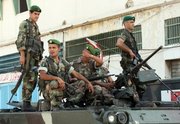 TRIPOLI, Lebanon (AFP) - Tension ran high in north Lebanon's capital of Tripoli on Sunday even as the army was deployed in force a day after a man died in an apartment block explosion. A security official told AFP that a tobacco shop run by an Alawite was set ablaze in the mainly Sunni district of Bab al-Tebbaneh, the scene of Saturday's blast in which 20 people were also wounded and several homes damaged. Civil defence workers put out the fire before it could spread to other businesses, the official said, declining to be named. The latest incident took place despite the deployment over the past week of army and interior ministry forces in the port city since deadly clashes between Sunnis and members of the Alawite community, an offshoot of Shiite Islam.
TRIPOLI, Lebanon (AFP) - Tension ran high in north Lebanon's capital of Tripoli on Sunday even as the army was deployed in force a day after a man died in an apartment block explosion. A security official told AFP that a tobacco shop run by an Alawite was set ablaze in the mainly Sunni district of Bab al-Tebbaneh, the scene of Saturday's blast in which 20 people were also wounded and several homes damaged. Civil defence workers put out the fire before it could spread to other businesses, the official said, declining to be named. The latest incident took place despite the deployment over the past week of army and interior ministry forces in the port city since deadly clashes between Sunnis and members of the Alawite community, an offshoot of Shiite Islam.
Armoured vehicles were posted at entrances to Bab al-Tebbaneh and two other densely populated districts, Jabal Mohsen and Al-Qobbe, where nine people were killed in sectarian clashes on June 22 and 23. It was still not publicly known on Sunday what caused Saturday's explosion which killed a local resident with no known political affiliation. Almost 500 people went to the victim's funeral which was also attended by dozens of armed militants, some wearing black headbands and chanting Koranic verses in praise of martyrdom. Lebanon's Sunni mufti, Mohammed Rashid Qabbani, condemned the explosion as a "criminal act aimed at spreading sedition," and urged all politicians to help Prime Minister Fuad Siniora in his protracted efforts to form a new government. Residents of Bab al-Tebbaneh who support the Western-backed majority in parliament have clashed repeatedly with Alawites in the nearby Jabal Mohsen district who backs hizbollah. Later on Saturday, three grenades exploded in Bab al-Tebbaneh over a half-hour period but no one was injured and no buildings were damaged, security officials said.
And two men were wounded on Friday night in Tripoli when a grenade went off, an army spokesman said, adding that one lost a leg in the blast. The Tripoli clashes have raised fears of a nationwide security breakdown amid protracted efforts by Siniora to form a national unity cabinet since a Qatari-brokered deal in May to end an 18-month political crisis. Rival factions continue to bicker over the distribution of key portfolios in a new 30-member government. The deal was struck after at least 65 people were killed in May in sectarian clashes that saw Hezbollah stage a spectacular takeover of mainly Sunni areas of west Beirut.
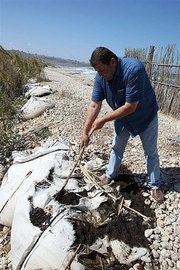 BEIRUT (AFP) - Two years after the worst oil spill in the east Mediterranean left thousands of tonnes of crude over three-quarters of Lebanon's coast, the beaches are almost all clean but the troubles continue. In July 2006, in the midst of the month-long war between Israel and Lebanon's Shiite Hezbollah fighters, Israeli aircraft bombed a coastal power plant at Jiyeh, 40 kilometres (25 miles) south of Beirut.Around 15,000 tonnes of oil flooded into the sea and was carried by the current, leaving 150 kilometres (95 miles) of coastline covered with thick black residue.
BEIRUT (AFP) - Two years after the worst oil spill in the east Mediterranean left thousands of tonnes of crude over three-quarters of Lebanon's coast, the beaches are almost all clean but the troubles continue. In July 2006, in the midst of the month-long war between Israel and Lebanon's Shiite Hezbollah fighters, Israeli aircraft bombed a coastal power plant at Jiyeh, 40 kilometres (25 miles) south of Beirut.Around 15,000 tonnes of oil flooded into the sea and was carried by the current, leaving 150 kilometres (95 miles) of coastline covered with thick black residue.
The once glitzy tourist beaches were covered with a film of filthy discharge and the breathtaking azure sea left blackened with oily deposits. Now after two years' work dedicated to it, the Mediterranean has recovered its blue and the white sandy beaches are back to their sparkling former glory. Only the Jozor al-Nakhel, or Palm Tree Island, nature reserve, west of the northern town of Tripoli is still being cleaned. But the impact of the spill remains a headache for Lebanon. At Jiyeh beach, more than 800 tonnes of oil-covered rocks and sand sit it huge heavy-duty plastic bags, only metres (yards) from the water's edge waiting for someone to work out how to get rid of them.
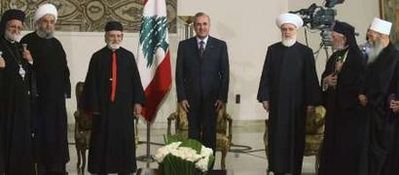 President General Michel Suleiman spoke at a meeting of Lebanon's top 15 Christian and Muslim religious leaders, who convened at the presidential palace after two days of sectarian clashes in the northern city of Tripoli left eight people dead and 40 wounded. Suleiman said the country's political and religious leaders must find a starting point to solve the crisis and heal the wounds. It was not immediately clear whether the Tripoli clashes
President General Michel Suleiman spoke at a meeting of Lebanon's top 15 Christian and Muslim religious leaders, who convened at the presidential palace after two days of sectarian clashes in the northern city of Tripoli left eight people dead and 40 wounded. Suleiman said the country's political and religious leaders must find a starting point to solve the crisis and heal the wounds. It was not immediately clear whether the Tripoli clashes
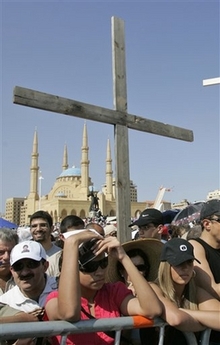 Daily Star - BEIRUT: Miraculous, perhaps. Tens of thousands of Lebanese gathered in Martyrs Square in Downtown Beirut on Sunday to witness the beatification of Yaaqoub Haddad, the late Capuchin priest who gained fame for his prolific work in founding an order of nuns, expanding the Capuchin school network and conceiving or establishing a number of religious and social institutions, some of which have gained iconic status in Lebanon. Haddad, who died more than 50 years ago, took a step toward sainthood in the first beatification ever to take place outside the Vatican - and people flocked to the capital to observe the ceremony.
Daily Star - BEIRUT: Miraculous, perhaps. Tens of thousands of Lebanese gathered in Martyrs Square in Downtown Beirut on Sunday to witness the beatification of Yaaqoub Haddad, the late Capuchin priest who gained fame for his prolific work in founding an order of nuns, expanding the Capuchin school network and conceiving or establishing a number of religious and social institutions, some of which have gained iconic status in Lebanon. Haddad, who died more than 50 years ago, took a step toward sainthood in the first beatification ever to take place outside the Vatican - and people flocked to the capital to observe the ceremony.
The service itself was presided over by a representative of Pope Benedict XVI, and the head of the Vatican's office for sainthood, Cardinal Jose Saraiva Martins, in tandem with Maronite Patriarch Nasrallah Butros Sfeir. Attended by a litany of Eastern Christian prelates, other clerics, international envoys and local political figures, the event also included the Lebanese political troika of President Michel Sleiman, Speaker Nabih Berri and Prime Minister Fouad Siniora. Thunderous applause greeted Sleiman as he arrived minutes before the Mass, and ovations were repeated many times during the ceremony, which bestowed one of the 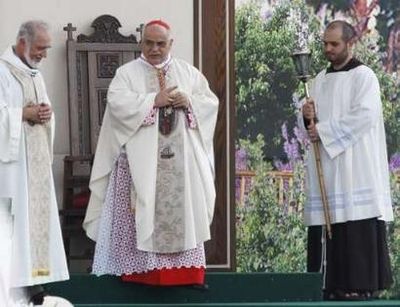 highest honors in the Christian tradition upon a Lebanese priest mere meters away from an Ottoman-era mosque in the heart of the capital. Indeed, while respectful or appreciative clapping often arose, the loudest rounds of applause came after "the nation" or the "Lebanese cedars" were mentioned in one context or another. A procession of the cross was held before Western Catholic - Latinized - renditions of Syriac and Arabic Christian chants held the massive gathering rapt. As Cardinal Martins read out a message from the pope, "hoping that this beatification will lift Father Yaaqoub of Ghazir as a happy servant of the Lord," a white veil cloaking a portrait of the late priest was lifted, symbolizing recognition of Haddad's beatification.
highest honors in the Christian tradition upon a Lebanese priest mere meters away from an Ottoman-era mosque in the heart of the capital. Indeed, while respectful or appreciative clapping often arose, the loudest rounds of applause came after "the nation" or the "Lebanese cedars" were mentioned in one context or another. A procession of the cross was held before Western Catholic - Latinized - renditions of Syriac and Arabic Christian chants held the massive gathering rapt. As Cardinal Martins read out a message from the pope, "hoping that this beatification will lift Father Yaaqoub of Ghazir as a happy servant of the Lord," a white veil cloaking a portrait of the late priest was lifted, symbolizing recognition of Haddad's beatification.
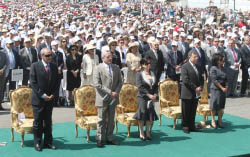 "The righteous will shine like the sun in the kingdom of their father," the Maronite patriarch said as he took the pulpit, evoking reverent silence through the assembled thousands. "The hope of so many Lebanese was realized today - that hope was the raising of Father Yaaqoub's portrait above the altar of the Catholic Church." Sfeir then outlined how Haddad "passed through the narrow door leading to sainthood," attributing the priest's ability to walk "the difficult road of a saintly life to three virtuous practices: surrender to the will of God, Christian modesty and the work of mercy." "Father Yaaqoub would say that 'All God has given me belongs to Him and the poor of Lebanon," added Sfeir, in reference to his first point regarding the late pastor. "He built hospitals, schools and took care of the sick, yet he was a man of simple means - Father Yaaqoub put his trust in the grace of God." Sfeir, describing the four "pillars of modesty" that characterized Haddad's life, again quoted the priest, saying: "Do not bestow virtue upon yourself that is not present within you; credit the Lord for that which is good in us; do not praise yourself in the presence of others; and do not count the shortcomings of those close to you in order to raise yourself."
"The righteous will shine like the sun in the kingdom of their father," the Maronite patriarch said as he took the pulpit, evoking reverent silence through the assembled thousands. "The hope of so many Lebanese was realized today - that hope was the raising of Father Yaaqoub's portrait above the altar of the Catholic Church." Sfeir then outlined how Haddad "passed through the narrow door leading to sainthood," attributing the priest's ability to walk "the difficult road of a saintly life to three virtuous practices: surrender to the will of God, Christian modesty and the work of mercy." "Father Yaaqoub would say that 'All God has given me belongs to Him and the poor of Lebanon," added Sfeir, in reference to his first point regarding the late pastor. "He built hospitals, schools and took care of the sick, yet he was a man of simple means - Father Yaaqoub put his trust in the grace of God." Sfeir, describing the four "pillars of modesty" that characterized Haddad's life, again quoted the priest, saying: "Do not bestow virtue upon yourself that is not present within you; credit the Lord for that which is good in us; do not praise yourself in the presence of others; and do not count the shortcomings of those close to you in order to raise yourself."
Khazen History


Historical Feature:
Churches and Monasteries of the Khazen family

St. Anthony of Padua Church in Ballouneh
Mar Abda Church in Bakaatit Kanaan
Saint Michael Church in Bkaatouta
Saint Therese Church in Qolayaat
Saint Simeon Stylites (مار سمعان العامودي) Church In Ajaltoun
Virgin Mary Church (سيدة المعونات) in Sheilé
Assumption of Mary Church in Ballouneh
1 - The sword of the Maronite Prince
2 - LES KHAZEN CONSULS DE FRANCE
3 - LES MARONITES & LES KHAZEN
4 - LES MAAN & LES KHAZEN
5 - ORIGINE DE LA FAMILLE
Population Movements to Keserwan - The Khazens and The Maans
ما جاء عن الثورة في المقاطعة الكسروانية
ثورة أهالي كسروان على المشايخ الخوازنة وأسبابها
Origins of the "Prince of Maronite" Title
Growing diversity: the Khazin sheiks and the clergy in the first decades of the 18th century
Historical Members:
Barbar Beik El Khazen [English]
Patriach Toubia Kaiss El Khazen(Biography & Life Part1 Part2) (Arabic)
Patriach Youssef Dargham El Khazen (Cont'd)
Cheikh Bishara Jafal El Khazen
Patriarch Youssef Raji El Khazen
The Martyrs Cheikh Philippe & Cheikh Farid El Khazen
Cheikh Nawfal El Khazen (Consul De France)
Cheikh Hossun El Khazen (Consul De France)
Cheikh Abou-Nawfal El Khazen (Consul De France)
Cheikh Francis Abee Nader & his son Yousef
Cheikh Abou-Kanso El Khazen (Consul De France)
Cheikh Abou Nader El Khazen
Cheikh Chafic El Khazen
Cheikh Keserwan El Khazen
Cheikh Serhal El Khazen [English]
Cheikh Rafiq El Khazen [English]
Cheikh Hanna El Khazen
Cheikha Arzi El Khazen
Marie El Khazen